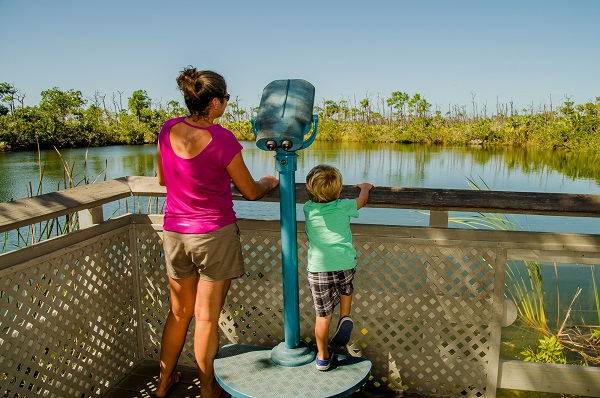Florida Keys National Wildlife Refuges Complex Phased Re-Opening

At 0800 on September 5, 2017, The U.S. Fish and Wildlife Service closed all facilities and trails and cancelled all planned programs in the Crocodile Lake National Wildlife Refuge on Key Largo, the National Key Deer Refuge on Big Pine Key and the Key West and Great White Heron National Wildlife Refuges in the lower Keys as a result of Hurricane Irma. Like our neighbors, the Refuges and Refuge infrastructure sustained the whole spectrum of hurricane damage ranging from cosmetic to total destruction. As Refuge staff, partners and contractors assist in recovery, Refuges will be opened to the public in a phased approach based on efforts to provide public safety, enforcement of federal laws on Refuges and the ability of staff and volunteers to support opening facilities and programs.
Crocodile Lake National Wildlife Refuge in Key Largo has never been open to daily public access pursuant to the existing Refuge Comprehensive Conservation Management Plan and remains closed to the public. Access is available through participation in a variety of organized volunteer programs and events.
The Key West National Wildlife Refuge and Great White Heron National Wildlife Refuge are officially open to the public on November 1, 2017 as they were before September 5th. The public should understand there are use and access restrictions within these Refuges and specific information can found on the Refuge website (http://www.fws.gov/nationalkeydeer/), Florida Keys National Marine Sanctuary website (https://floridakeys.noaa.gov/zones/allzones.html?s=zones ) on Refuge Information tear sheets and on the Key’s Adventure Guide for the Lower Keys (aka Teall’s Guide) which can be obtained at the Refuge Administrative Office on Big Pine Key or local fishing and dive retailers respectively.
Trails within the National Key Deer Refuge that were open prior to September 5th such as the Blue Hole and Watson/Mannillo Trails are open to the public on November 1, 2017. Trails closed prior to September 5th remain closed. Some previously established trails such as the Long Beach Trail sustained significant hurricane damage and are not navigable but the natural, rustic beachfront remains open and accessible for low-impact nature observation on foot. The Refuge Visitor Center at the Winn Dixie shopping plaza on Big Pine Key remains closed as a result of building damage.
Updates regarding further re-openings, especially the Visitor Center, will be announced through our website, local print and radio press releases and our Facebook page. Residents and visitors are encouraged to exercise caution when accessing open areas of the Refuges, such as fire roads, as new natural hazards may exist (e.g. uneven terrain and vegetation debris). Please observe all posted placards and signs and enjoy your Refuges as we all work on hurricane recovery.
For more information, please contact Dan Clark at 305-872-2239 ext. 209 or Christine Ogura at 305-872-2239 ext. 226 and follow Refuge updates on our website and Facebook page: http://www.fws.gov/refuge/National_Key_Deer_Refuge/About_the_Complex.html
https://www.facebook.com/floridakeysrefuges
~~~~~~~~~~~~
The National Wildlife Refuge System protects wildlife and wildlife habitat on more than 150 million acres of land and water from the Caribbean to the Pacific, Maine to Alaska. Refuges also improve human health, provide outdoor recreation, and support local economies. Visit our home page at http://www.fws.gov/refuges/.
The mission of the U.S. Fish and Wildlife Service is working with others to conserve, protect, and enhance fish, wildlife, plants, and their habitats for the continuing benefit of the American people. We are both a leader and trusted partner in fish and wildlife conservation, known for our scientific excellence, stewardship of lands and natural resources, dedicated professionals, and commitment to public service. For more information on our work and the people who make it happen, visit http://www.fws.gov/.

